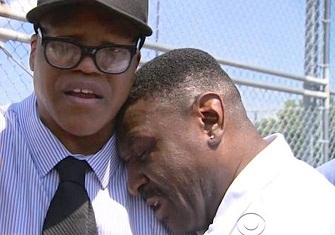Two Innocent Men Spend 30 Years In Prison For Murder They Did Not CommitThe longest-serving death row inmate in North Carolina is exonerated using DNA evidence.Police State USA Sep. 15, 2014 |
Popular 
Trump Confronts South African President on White Genocide

Trump, After Rearming Israel, 'Frustrated' With Netanyahu for Expanding War

CNN: U.S. Officials Say Israel Preparing Possible Strike on Iran

Israeli PM Netanyahu: Trump Told Me 'I Have Absolute Commitment to You'

U.S. Official Denies Report Trump Team Told Israel 'We Will Abandon You' If You Don't End Gaza War
  [Pictured: Leon Brown (left) and Henry McCollum (right) embrace after an emotional vindication.] [Pictured: Leon Brown (left) and Henry McCollum (right) embrace after an emotional vindication.]ROBESON COUNTY, NC — Following three decades in prison, two brothers — one being North Carolina’s longest-serving death row inmate — have been exonerated of a murder conviction using DNA evidence. * * * * * In 1984, two half-brothers, Henry Lee “Buddy” McCollum and Leon Brown, were tried and convicted of a rape and murder of an 11-year-old girl in Robeson County. Both were initially sentenced to death, but Brown received a life sentence after a second trial. After thirty years of appeals, DNA evidence has finally revealed that the men who were convicted were not actually Sabrina Buie’s murderers. A reexamination of the case suggests that the two young defendants faced coercive and malicious prosecution. McCollum, who was 19 years old at the time of the murder, is “mentally retarded,” as court records acknowledged, with an IQ between 60 and 69, illiterate, with the mental faculties of a 9-year-old. Brown was 15 years old at the time of his arrest, was also illiterate, with an IQ as low as 49. Dubious ‘Confessions’ The entire case against the two young defendants relied solely on two confessions — the only “evidence” tying the brothers to the crime. The two were implicated in Sabrina Buie’s murder when a 17-year-old female high school student pointed to McCollum and Brown as possible suspects. Police rounded up McCollum and Brown, individually, and spent hours getting the young men to crack. After long sessions of “yelling and screaming,” the two incompetent suspects were coached into signing confessions written by the investigators. The signatures were scrawled in block letters. There were no recordings or documentation kept about what was said in those interrogation rooms, but the boys each said later that they were promised that they could go home if they signed the papers. There is much to suggest that they did not fully understand the ramifications of what they were being asked to sign. Days later, the teen who implicated the two brothers acknowledged that she had no direct knowledge of their involvement in the murder. She named them because she claimed they made her feel uncomfortable when they stared around their neighborhood. But by the time of this revelation, the prosecution had already acquired signed confessions and there was no turning back. The brothers subsequently recanted the confessions 226 times, on record, but it was not enough to keep them from being convicted and condemned. The prosecution was led by Joe Freeman Britt, who later achieved the title of America’s “deadliest D.A.” in the Guinness Book of World Records. By 1988, he had racked up 47 death row convictions. In the zealous effort to convict the brothers, prosecutors overlooked glaring evidence that implicated another man in the murder: Roscoe Artis, a known sexual predator who had committed another murder in the area weeks earlier. Artis’ fingerprint was found on a piece of evidence at the scene, but was dismissed. As technology evolved, the presence of Artis’ DNA was also confirmed on a cigarette found at the scene, but that too was dismissed. “You find a cigarette, you say it has Roscoe Artis' DNA on it, but so what?” now-retired D.A. Joe Freeman Britt said. “It's just a cigarette, and absent some direct connection to the actual killing, what have you got? Do you have exoneration? I don't think so.” A Superior Court judge in Robeson County, Douglas B. Sasser, vacated the convictions of the two men in September 2014. McCollum, now 50, and Brown, 46, were both released this week following three decades of living in prison. McCollum spent most of his life anticipating his turn to be executed. The brothers now have to reintegrate into a society that’s unrecognizable from the one they were forced away from three decades ago. Attorney Kenneth J. Rose and the Center for Death Penalty Litigation were integral in exonerating the brothers. “I am angry that we live in a world where two disabled boys can have their lives stolen from them, where cops can lie and intimidate with impunity, where innocent people can be condemned to die and where injustice is so difficult to bring to light,” wrote Rose. D.A. Joe Freeman Britt is now comfortably retired after a profitable career in filling prisons in Robeson County. Despite the grievous injustice wrought upon the hapless young men, neither he nor any other public servant will face any consequences for the dubious tactics used in this case. As Kenneth Rose asked, “How many more Henry McCollums are still imprisoned, waiting for help that will never come?” |



